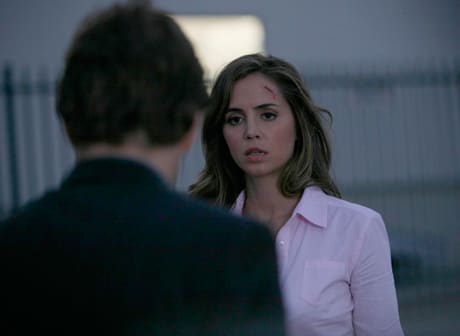If you were to make a list of dangers that could befall an ambitious sci-fi-oriented TV show on a quest to find loyal viewership and an authorial voice, Dollhouse tripped pretty much all those landmines. Coming from the mind of nerd god Joss Whedon (Buffy, Firefly), Dollhouse starred Eliza Dushku (known to Buffy fans as Faith) as a living "doll" who could be programmed to be whomever, and do whatever, the well-heeled clientele would pay for. Season one spent a lot of time in one-off episodes that featured Dushku in various semi-fetish wear outfits and scenarios ― from schoolgirl to dominatrix to hostage negotiator. In its earliest episodes, it was difficult to tell what parts of the show were meant to entertain, given that Dushku's "Caroline" (her original self who agreed to a five-year program of, well, being programmed) had uncertain motives for signing up for this plan. Played for titillation, Dollhouse was creepy, gross and misogynist. But there was an undercurrent happening on this show ― that, yes, the Dollhouse isn't just creepy but on the thin edge of a technological wedge that will help destroy Western culture. As revealed in season one's climactic episode, "Epitaph One," the world of personality replacement is a slippery slide into chaos. Just one problem heading into season two of Dollhouse though ― the network never aired "Epitaph One," leaving it to languish as an unaired episode on the first season DVD set. It's with that fractured narrative history that Whedon sets into season two, with a show that is fundamentally designed around, and changed by, an episode that was never broadcast. And so Whedon ― with the history of mistreatment by the network for his show Firefly surely on his mind ― takes a flamethrower to typical network notes, to audience expectations, even to common sense in Dollhouse season two. It's never going to last, he seems to be saying, so let's tell cool stories that we want to tell until someone turns the lights out. And that's what happens in this second and inevitably final season of an ambitious show with clueless network "parents" ― it revealed the dark, evil heart of the Dollhouse idea. It unveiled the mental toll that personality imprints have on their subjects and revelled in the end-times vibe that "Epitaph One" hinted at. It turned from "Dushku's stripper costume of the week" into a tense ensemble drama that particularly highlighted the talents of her fellow "dolls," played by Enver Gjokaj and Dichen Lachman. And it gave a clearer sense of the show's bigger arcs than fans ever got of Whedon's short-lived (but still beloved) Firefly. "That's more than we expected" is the overall vibe of the DVD set's extras ― whether in a post-show roundtable in on-set footage or on a handful of episode commentaries, this is a cast and crew playing with house money, knowing that it's not going to last, but that what they're doing is fun, cool and will find a devoted home audience. As the scene fades on Whedon's "last supper" with his cast, he jokes, "see you at the cons." It's not a joke. This show will have a loyal nerd audience not just for years, but generations. Plus: deleted scenes, outtakes.
(Fox)Dollhouse Season 2

BY James KeastPublished Nov 4, 2010